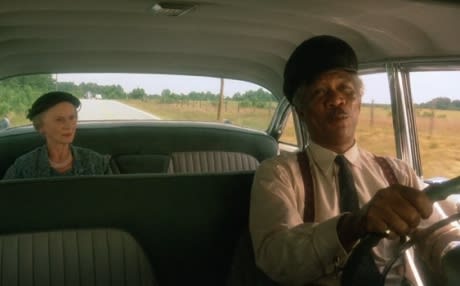Much like the Warner "special edition" Blu-Ray release of The Color Purple, Driving Miss Daisy comes in a small hardcover book, featuring 32 pages of interviews and factoids about the locations, actors, financing and source play. It's all information that's reiterated in the supplemental material on the "making of" and the career of Jessica Tandy, but the tactile aspect, juxtaposed against still photography, is a nice, dignified addition to the Blu-Ray package. As for the film, time has treated it well. Based upon a play by Alfred Uhry, this story of an elderly Jewish woman and her black driver in '50s Atlanta is mostly about conversations and character chemistry. Since Bruce Beresford took a classic approach to the material, framing everything with an eye for location and emotional heft, the usual limiting stylistic factors haven't imposed themselves upon the material, leaving the core text of race relations and pre-Civil Rights climate in the U.S. untarnished. If anything, the central relationship component between Daisy Werthan (Jessica Tandy) and her driver, Hoke Colburn (Morgan Freeman), is as relevant today as when this film was released in 1989, winning Best Picture that year. Though Daisy and Hoke's unspoken connection is that of subjugation, with Jews being relegated to the periphery of American society in a less overt manner — there weren't separate public washrooms and water fountains for Jews — she is unable to interpret their experiences as equal or shared. This is particularly clear when Hoke responds to news that her Temple has been bombed with a story about a lynching he witnessed in his childhood. Confused by his decision to share his story at that time, she outwardly denies the existence of discrimination or her role as a minority, even though she strongly advocates Martin Luther King and responds with panic when the police appear. Even if her character portrait as stubborn and excessively frugal is somewhat clichéd, and even noting that her initial interest in Hoke is that of a pet, teaching him to read like one of her students, there is a vacuum component to Driving Miss Daisy that continues to be relevant throughout time as different groups seek equal rights. Existing within her own bubble, only able to establish true connection with those that have similar life experiences, she justifies and controls her world in a way that makes it liveable, trying her best to ignore some of the more inhuman worldly elements that, if doted upon, could become overwhelming.
(Warner)Driving Miss Daisy [Blu-Ray]
Bruce Beresford

BY Robert BellPublished Jan 15, 2013